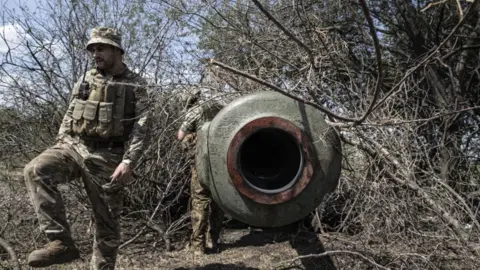Kherson: Ukraine claims new push in Russian-held region
 Getty Images
Getty ImagesUkraine's military says it has broken through Russia's first line of defence in the occupied Kherson region.
The reported push appears to form part of a long-awaited counter-offensive being launched by Kyiv in an attempt to retake the country's south.
It follows weeks of Ukrainian attacks aimed at cutting off Russian forces there from main supply routes.
Russia's military claims that Ukrainian troops suffered "heavy losses" during an unsuccessful attacking attempt.
The claims by both Ukraine and Russia have not been independently verified.
Kherson became the first major Ukrainian city to fall into Russian hands after troops advanced into the city from the Crimean Peninsula in the opening days of the war.
Early on Monday, Ukraine's Kakhovka operational group in the south said that one regiment of Russian-backed forces had left its positions in the Kherson region. It added that Russian paratroopers providing the back-up had fled the battlefield.
Oleksiy Arestovych, adviser to President Volodymyr Zelensky's head of office, later also said that Ukraine's armed forces "have broken through the frontline in several places".
In his late night video address, President Zelensky issued a stark warning to Russian forces: "If they want to survive, it is time for Russian soldiers to flee. Go home."
Explosions and shots were heard for a second day on Tuesday in the regional capital of Kherson. Blasts had earlier been reported in Nova Kakhovka, some 55km (34 miles) north-east and Russia's state-run Ria Novosti news agency reported the city was left without electricity and water supply overnight.
In an update early on Tuesday, a spokesman for Ukraine's southern operational command said 13 Russian command posts had been destroyed, as well as three ammunition depots and a crossing over the Dnipro river.


Kyiv officials say they have used US-supplied Himars rocket systems to destroy key crossings on the Dnipro in recent weeks and are now targeting makeshift Russian pontoon bridges.
According to Western military sources, Kyiv's strikes are part of a targeted effort to cut off Russian troops on the right (western) bank of the river with the ultimate goal of recapturing the entire Kherson region. A UK defence intelligence assessment said Russia had made significant efforts to reinforce the western bank but most of its units were "likely undermanned and are reliant upon fragile supply lines".
President Zelensky and other top Ukrainian officials have been tight-lipped about details of the reported counter-offensive, urging Ukrainians to be patient.
Responding to the Ukrainian claims, Russia's defence ministry said that Ukrainian troops had attempted an offensive in the Kherson and neighbouring Mykolaiv regions.
The ministry was quoted by Russia's state-run news agencies as saying this operation had failed, and that the Ukrainian troops had "suffered heavy losses".

Counter-offensive fraught with difficulty

Retaking Kherson from the Russians will be a major challenge for Ukraine. This southern city was captured early in the war with little resistance so Russian forces have had months to dig in, bring in reinforcements and prepare for any counter-attack.
Since the invasion began in February, Ukraine has been fighting almost entirely defensive battles, putting up a stoic resistance to overwhelming Russian numbers. It has had little experience of offensive operations which generally require a different skill set, an advantage in numbers and large reserves of ammunition and troops.
The Russians have been able to take the territory they have in Donbas and places like Mariupol because they have no hesitation in reducing a town to rubble with massed artillery and little consideration for civilian casualties. Ukraine though, does have these constraints and it will not want to see this vital port city flattened to ashes.
But in Ukraine's favour are ever-increasing numbers of long-range Western-supplied arms which can cut off Russian supply lines, plus the fact that this is their land and their determination to recover it gives them a greater incentive than most of the Russian invaders.

Kherson, which had a population of 290,000 before the war, is the only regional capital to have been taken by Russian forces and is currently administered by Moscow-backed officials.
According to Russia's Tass news agency, officials in the Kherson region have started moving forward with plans to hold a referendum on formally joining Russia, prompting accusations by the US that Russia could be preparing to illegally annex parts of occupied southern Ukraine.
Last month, Russia said its military focus was no longer only on eastern Ukraine but on its southern regions of Kherson and Zaporizhzhia too.
Speaking to Russia's RIA news agency, the head of the Russian installed administration, Kirill Stremousov, insisted the city was not under threat of attack and said the "more the area is shelled, the more its inhabitants demand a referendum".
Elsewhere, at least five people were killed when Russian shells hit the centre of Kharkiv in north-east Ukraine on Tuesday, according to the city's mayor. Two people were killed by Russian artillery fire on the southern city of Mykolaiv, city officials said on Monday.
Meanwhile, an inspection team from the UN nuclear watchdog has arrived in Ukraine ahead of a planned visit to the Zaporizhzhia nuclear plant. Ukrainian officials say the team will travel to the plant in the coming days.
Russian-installed officials in the Zaporizhzhia region have again accused Ukrainian forces of shelling the area around the plant. They said on Monday that a hole had been punched in the roof of a fuel depot by a missile strike.
The claim has not been independently verified.
In recent weeks, both Ukraine and Russia have accused each other of shelling Europe's biggest nuclear station, which was seized by Russia in early March. Moscow has kept Ukrainian personnel to operate the station.
Last week, Ukrainian President Volodymyr Zelensky said the world narrowly avoided a radiation accident at the plant, blaming Moscow's actions for this.
